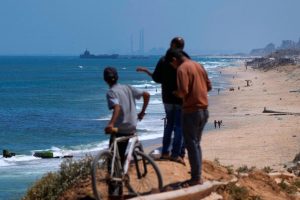
Jackson also said her “exhausting” journey to the Supreme Court also led her to accept the invitation to speak.
“I come with the understanding that I did not reach these professional heights on my own, that people of all races, people of courage and conviction cleared the path for me in the wake of the horrible tragedy that snuffed out the brief lives of those four little girls inside this sacred space,” she said. “I’ve come to Alabama with a heart filled with gratitude, for unlike those four little girls, I have lived, entrusted with the sole responsibility of serving our great nation.”
But Jackson didn’t speak in the abstract about what happened in Birmingham 60 years ago. She spoke about how her parents made sure that she knew about such painful events that occurred in the struggle for civil rights. Her parents worked in education: Jackson’s father as an attorney for the school board of Miami-Dade County and her mother as a school principal.
“There was a reason that my parents felt it was important to introduce me to those uncomfortable topics and it was not to make me feel like a victim or crush my spirits,” Jackson said. “To the contrary, my parents understood that I had to know those hard truths in order to expand my horizons. They understood that we can only know where we are and where we’re going, if we realize where we’ve been.”
MSNBC opinion writer Jarvis DeBerry noted this about Jackson’s speech:
She specifically mentioned that when she was a girl of four or five, she knew the month, day and year when Rosa Parks was arrested for protesting segregated seating on a Montgomery bus. A young Kentanji knew enough about the civil rights movement that she could look at a black-and-white photo and pick out John Lewis’ face from a crowd on the Edmund Pettus Bridge in Selma.
And she knew what had happened at the 16th Street Baptist Church. Describing herself as the mother of “young women” who will always be “my little girls,” Jackson said, “I can imagine no greater horror than to lose a child this way.”
[…]
“Tough stuff for a child,” Jackson said of the “darker moments” that her mother and father required her to know, “but my parents never lied to me.”
[…]
Her parents’ goal, Jackson said, was to do their best to make sure she was “prepared for life in America.” She said, “I had to know those hard truths in order to expand my horizons.” In other words, she wouldn’t be who she is or where she is if she hadn’t been taught the harsh, unvarnished truth of American history.
And lest we presume such dark times are behind us? Forget not that a young white supremacist, Dylann Roof, killed nine Black members of a Bible study group, including a state senator, in Charleston, South Carolina, in June 2015. President Barack Obama, in a speech following the massacre, quoted from the Rev. Dr. Martin Luther King Jr.’s eulogy for the four young girls killed in the 1963 Birmingham church bombing.
I am confident that the outpouring of unity and strength and fellowship and love across Charleston today, from all races, from all faiths, from all places of worship indicates the degree to which those old vestiges of hatred can be overcome. That, certainly, was Dr. King’s hope just over 50 years ago, after four little girls were killed in a bombing in a black church in Birmingham, Alabama.
He said they lived meaningful lives, and they died nobly. “They say to each of us,” Dr. King said, “black and white alike, that we must substitute courage for caution. They say to us that we must be concerned not merely with [about] who murdered them, but about the system, the way of life, the philosophy which produced the murderers. Their death says to us that we must work passionately and unrelentingly for the realization of the American Dream.
“And if one will hold on, he will discover that God walks with him, and that God is able to lift you from the fatigue of despair to the buoyancy of hope, and transform dark and desolate valleys into sunlit paths of inner peace.”
Watch Rev. Dr. King’s full eulogy below.
Back to Friday’s speech: Jackson noted that unfortunately this country still has to deal with acts of racial violence, making it even more important to learn from history.
“History is also our best teacher. Yes, our past is filled with too much violence, too much hatred, too much prejudice. But can we really say that we are not confronting those same evils now?” Jackson said.
“We have to own even the darkest parts of our past, understand them and vow never to repeat them. We must not shield our eyes. We must not shrink away lest we lose it all,” she said.”
Here is Jackson’s full 27-minute speech to the engaged crowd at the 16th Street Baptist Church.
Additionally, here is an interview with Sarah Collins Rudolph, reflecting on the attack 60 years later. She lost an eye but survived the bombing that killed her sister, 14-year-old Addie Mae Collins.









